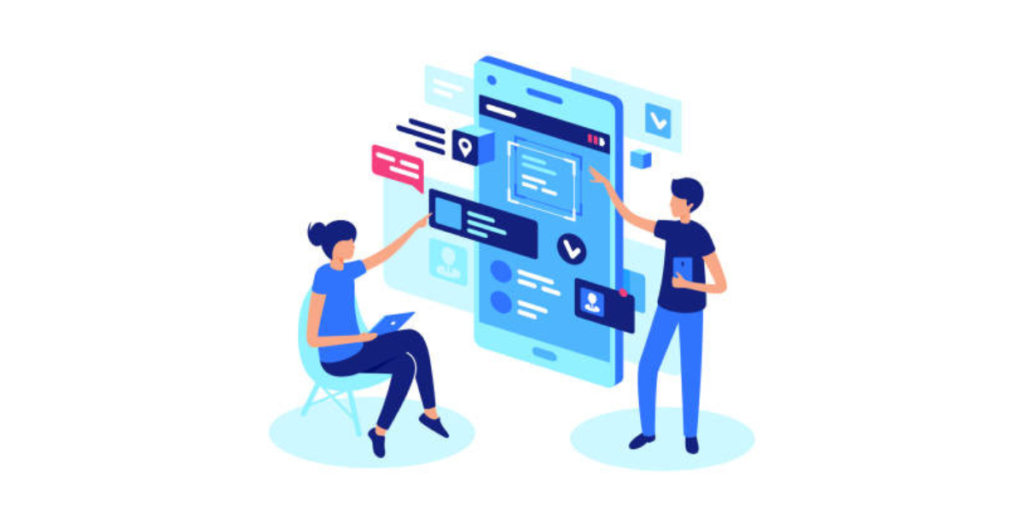Artificial Intelligence (AI) technology available today may accelerate the procedure of mobile app development. They can boost the user experience and performance of mobile apps. The creation of AI-powered applications is gaining popularity. AI and machine learning are vital for new app features. They are used for code creation, automated testing, and optimizing UX and performance.
By 2030, the global AI market is expected to hit $2 trillion. That’s a huge number, especially since AI has only recently become popular. The mobile app industry is also booming, projected to generate over $755 billion in revenue by 2027. So, it’s no surprise that AI and mobile apps are coming together. In fact, AI can greatly improve the mobile app experience.
Today, we’re going to talk about artificial intelligence in mobile app development and explore ten key ways it can improve your app. As the top mobile app development company in the USA, we know new technologies can boost your organization’s performance. Let’s get started!
Top 10 AI Ways to Boost Mobile App Development
AI-powered Code Generation
AI-driven code creation optimizes mobile app development. It automates tedious tasks and offers recommendations. Code completion can be automated with programs like GitHub Copilot. They make it easier and faster for app developers to build code.
AI can also produce boilerplate code, which is frequently used in app development. It can be applied when creating a new project for mobile apps. Additionally, it excels at producing recurring code segments, such as form fields. Developers can save a great deal of time and effort by using such technologies.
For example, tools like GitHub Copilot and IntelliCode provide smart code completions. They analyze the context of your written code to make accurate suggestions. Many of these tools are available as plugins for popular IDEs used by mobile app developers, such as Xcode or Android Studio.
AI-assisted Testing and Debugging
AI-assisted testing and debugging solutions automate various testing jobs and related work. Testim and Applitools are test case generation tools that leverage AI to generate test cases, improving coverage and minimizing manual labor.
The AI tools discussed in the preceding section can aid in writing unit tests. They can also produce additional kinds of code-written tests, like end-to-end and integration tests.
AI-driven User Interface Design
Tools like Uizard and Sketch2Code create UI elements from design specs, turning mockups into functional code to save manual work. AI also optimizes layouts for various screen sizes. For example, Framer uses AI to adjust UI components for different screen dimensions. AI can recommend design improvements based on user data. This assists developers in creating interfaces that are more intuitive and user-friendly.
Natural Language Processing for App Localization
These days, advanced translation programs include Lokalise and Transifex. They have powerful natural language processing features. They are capable of translating multilingual mobile app content. These translations are accurate and appropriate for the target culture. Not only may they be utilized within mobile applications, but they can also be found in app stores for text. Natural Language Processing is also used by tools such as Phrase and Smartling.
AI-powered Performance Optimization
AI technology facilitates the management and distribution of resources. Resources can be dynamically allocated depending on demand using tools like Kubernetes. This guarantees cost-effectiveness and peak performance. Similarly, tools like Akamas can identify caching strategies to shorten load times. After that, they distribute the loads among the servers to keep response times quick and bottlenecks at bay.
AI-enhanced Security Implementation
Tools for automatically detecting vulnerabilities and applying patches exist, such as Snyk and Mend.io. They can automatically apply updates and continuously scan codebases for vulnerabilities related to app security. As a result, they lessen the possibility of exploitation.
Okta’s Auth0 offers intelligent user authentication solutions. It applies adaptive authentication mechanisms and analyzes user behavior using AI technologies. It can lessen obstacles for authorized users while ensuring secure access.
Ai-Driven User Behavior Analysis and Personalization
Amplitude and Mixpanel are examples of predictive user modeling systems that examine user activity data. They can predict the behavior and preferences of users in the future. Automated A/B testing platforms like Google Optimize and Optimizely use AI. They can conduct tests, forecast user behavior, and determine the most successful iterations. AI algorithms are also used in content recommendation systems, such as those offered by Recombee and Algolia. They make appropriate content recommendations by examining user behavior, interactions, and preferences.
AI-assisted API Integration & Management
Tools like New Relic and Dynatrace leverage AI algorithms to monitor and optimize API performance. They track API performance, identify anomalies, and offer actionable insights to enhance efficiency.
AI-powered Asset Management & Optimization
AI is also used in media compression tools like TinyPNG, which reduce file sizes while keeping quality intact. AI manages and caches assets for services like Cloudflare and StackPath. This lowers server load and speeds up delivery. Google Cloud CDN analyzes user behavior. It quickly loads the most relevant resources. This improves performance and user engagement.
AI-enhanced Collaboration & Project Management
Asana and Trello use AI to assign tasks based on team members’ accessibility and skill levels. Jira and Monday also use AI to monitor milestones for the project. They produce status reports in real-time and offer information on the project’s health. Other notable examples are deadline and resource management applications like Wrike and ClickUp. To meet deadlines, they use AI. It predicts project timetables, finds bottlenecks, and recommends resource changes.
Conclusion
In conclusion, AI is changing mobile app development. It streamlines processes, improves user experiences, and cuts development time. From smart code completions to better app performance, these AI tools can speed up development and boost your app’s success. Ready to take your app to the next level? Contact tecHangouts, the best mobile app development company, to leverage AI and bring your vision to life!







More Stories
Transforming Retail Experiences with AI in Retail: Personalization, Automation, and Smarter Inventory Management
The Art of Web Designing in Dubai UAE
7 Programming Languages for WordPress Sites